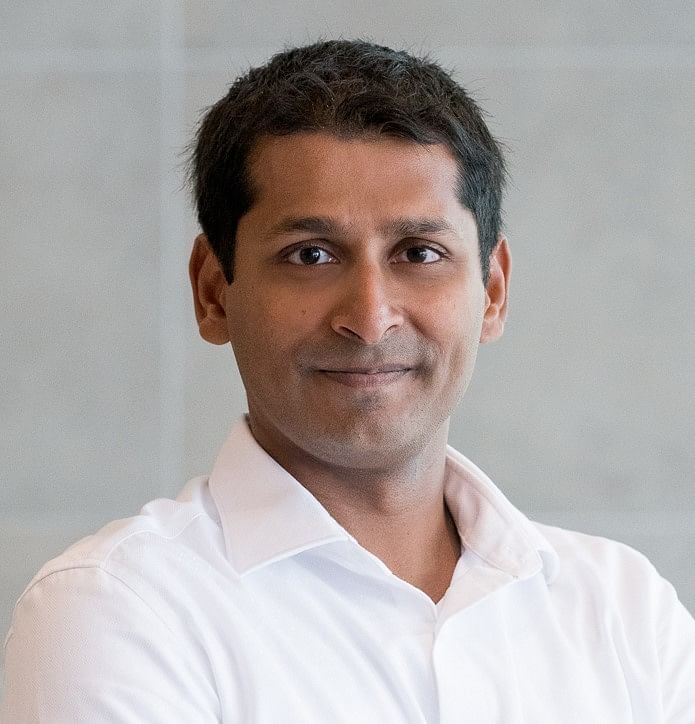AI platform could allow doctors to reduce chemotherapy drug dose for cancer patients
Sign up now: Get ST's newsletters delivered to your inbox

Professor Dean Ho (right) and Dr Agata Blasiak embarked on a clinical trial, called Precise.Curate, from August 2020 to April this year.
ST PHOTO: GAVIN FOO
SINGAPORE - Cancer patients here who need chemotherapy could soon receive more personalised and effective treatment with potentially reduced side effects, through the help of artificial intelligence.
The AI tool - known as Curate.AI - prescribes patients with the most optimal drug doses throughout the course of their chemotherapy - such that they receive maximum results with minimal side effects.
"Chemotherapy treatment is often given at fixed doses, and it is often calibrated based on the degree of side effects that a patient experiences during the course of their treatment," said Professor Dean Ho, who heads the Department of Biomedical Engineering at the National University of Singapore's (NUS) College of Design and Engineering.
This may not yield the most effective results for the patient, he noted. Instead, looking at a treatment's effectiveness and customising the optimal dose for them throughout their treatment cycle could prolong the period in which the patient remains responsive to treatment.
For some, these doses may potentially be lower than the high doses that are traditionally used, said Prof Ho.
To prove that Curate.AI can work in real-world settings, the NUS team embarked on a clinical trial, called Precise.Curate, from August 2020 to April this year.
The trial, conducted in collaboration with clinicians from the National University Cancer Institute, Singapore (NCIS), which is part of the National University Health System, involved 10 patients with advanced solid tumours, many of whom had stage-four colorectal cancer.
Solid tumour cancers include cancers of the breast, lung, prostate, colon, bladder and kidney.
Curate.AI harnesses a patient's clinical data, which includes the chosen drug type, dose and cancer biomarkers to generate an individualised digital profile which is then used to customise the optimal doses during chemotherapy.
Dr Agata Blasiak, head of digital innovation at NUS' N.1 Institute for Health, as well as the presenting author and co-corresponding author of the study, said the clinicians were then permitted to accept or reject the dose recommendations based on their clinical judgment.
Even then, close to 97 per cent of the dose recommendations were accepted, and some patients were prescribed optimal chemotherapy doses that were around 20 per cent lower on average, compared with a standard dose.
The trial was kept as realistic as possible to ensure that it would still be viable in real-world clinical settings.
For instance, some patients chose to skip their chemotherapy treatment, for reasons such as unbearable side effects, Dr Blasiak noted.

Curate.AI is able to incorporate these decisions and to fine-tune the dosing recommendations accordingly.
Dr Raghav Sundar, a principal investigator of the trial and a consultant at NCIS' Department of Haematology-Oncology, said a key aim of the trial was to empower clinicians to identify the optimal dose for each patient, without adding to their workload. In this way, clinicians can focus more on the patient and caregiver, he noted.
Said Prof Ho: "This is a milestone from our early-stage data in showing the feasibility of integrating AI into treatment and hospital workflows. Having lower doses of a drug could also pave the way for lower treatment costs."
The results of the pilot trial were presented on Sunday (June 5) at the 2022 American Society of Clinical Oncology (Asco) annual meeting in Chicago to showcase the latest advancements in cancer research.
Asco is a leading professional organisation for healthcare practitioners who care for people with cancer.
The NUS team will now advance towards larger, randomised trials to further validate the performance of the optimisation platform.
Noting that a growing number of cancer patients are being treated with immunotherapy - which involves harnessing the body's immune system to fight cancer, Prof Ho said future trials will also incorporate this form of treatment.
The research team will also be conducting clinical trials involving patients with other types of cancers, like blood cancer, as well as other diseases like high blood pressure.
Clinicians who were not involved in the study said the platform can potentially minimise a patient's side effects while keeping the cancer under control, especially for late-stage patients.
Dr Huren Sivaraj, a medical oncologist and chief executive of Oncoshot, a cancer AI platform, said it will be important to understand how the use of Curate.AI could impact the patient's experience of side effects and his cancer response, compared with the standard dosing they would otherwise receive, as well as the healthcare cost savings over the longer term from using optimal drug doses.
It would also be important for the tool to be trialled on other types of cancer therapies, as well as a wider range of biomarkers so that the system can also be applied to other cancers.


